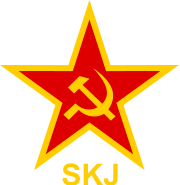League of Communists of Slovenia
League of Communists of Slovenia Zveza komunistov Slovenije Savez komunista Slovenije | |
|---|---|
.svg.png) | |
| Leader | see full list below |
| Founded | April 1937 |
| Dissolved | 4 February 1990 |
| Succeeded by | Party of Democratic Renewal |
| Headquarters | Ljubljana, SR Slovenia, SFR Yugoslavia |
| Ideology |
Communism Marxism-Leninism Titoism |
| Political position | Far-left |
| Colours | Red |
| Party flag | |
 | |
|
Slovenian branch of the League of Communists of Yugoslavia | |
The League of Communists of Slovenia (Slovene: Zveza komunistov Slovenije, ZKS; Serbo-Croatian: Savez komunista Slovenije) was the Slovenian branch of the League of Communists of Yugoslavia, the sole legal party of Yugoslavia from 1945 to 1989. It was established in April 1937 as the Communist Party of Slovenia, as the first autonomous sub-national branch of the Yugoslav Communist Party.
Its initial autonomy was further amplified with the Yugoslav constitution of 1974, which devolved greater power to the various republic level branches.
In 1989 Slovenia passed amendments to its constitution that asserted its sovereignty over the federation and its right to secede. These amendments were bitterly opposed by the leadership of Serbia under Slobodan Milošević. On 23 January 1990, the Slovene delegation, headed by Milan Kučan, left the Party Congress of the League of Communists of Yugoslavia, leading to the collapse of the all-Yugoslav party.
On 4 February 1990 the League of Communists of Slovenia changed its name to the Party of Democratic Reform (Stranka demokratične prenove - SDP), and shortly afterwards began negotiations with the Democratic Opposition of Slovenia for the establishment of a multi-party system. In April 1990, the reformed Communists lost the elections to the DEMOS coalition. In 1992, they ceased to be the largest left wing party and entered a period of radical transformation, which gained momentum with the election of Borut Pahor as the party chairman. Their legal successors are the Social Democrats (SD.)
Party leaders
- Franc Leskošek (1937–1945) (1897–1983)
- Boris Kidrič (1945–1946) (1912–1953)
- Miha Marinko (1946–1966) (1900–1983)
- Albert Jakopič (October 1966– December 1968) (1914–1996)
- Franc Popit (December 1968 – April 1982) (1921–2013)
- Andrej Marinc (April 1982 – May 1986) (born 1930)
- Milan Kučan (May 1986 – December 1989) (born 1941)
- Ciril Ribičič (December 1989 – May 1990...)
Other influential leaders
- Edvard Kardelj (1910–1979)
- Tone Tomšič (1910–1942)
- Vida Tomšič (1913–1998)
- Boris Kraigher (1914–1967)
- Lidija Šentjurc (1911–2000)
- Ivan Maček (1908–1993)
- Sergej Kraigher (1914–2001)
- Boris Ziherl (1910–1976)
- Stane Dolanc (1925–1999)
- Mitja Ribičič (1919–2013)
- Prežihov Voranc (1893–1950)
- Dragotin Gustinčič (1882–1974)
- Stane Kavčič (1919–1987)
- Viktor Avbelj (1914–1993)
- Vladimir Krivic (1914–1996)
- Ivan Regent (1884–1967)
- Jože Potrč (1903–1963)
- Aleš Bebler (1907–1981)
- Joža Vilfan (1908–1987)
- Mirko Košir (1905–1951)
- Angela Vode (1892–1985)
- Dušan Kermavner (1903–1975)
- France Klopčič (1903–1986)
- Dušan Pirjevec (1921–1977)
- Franc Šetinc (1929–2016)
- Janez Vipotnik (1917–1998)
- Vinko Hafner (1920–2015)
- Jože Smole (1927–1996)
